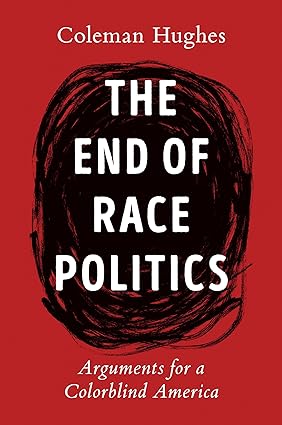
Disclaimer: this is one of those books where, in my case, the author, Coleman Hughes, is pushing on an open door. I found myself in violent agreement with just about everything he says here. I'm in no mood to be critical, and have nothing to be critical about.
One of my longtime puzzlements is how counterproductive the "progressive" attitudes toward racial issues in the US are. Their criticisms are unbalanced; their proposed "solutions" seem designed to worsen social ills rather than mend them, stirring up suspicion, resentment, and hostility on all sides.
(When I say "longtime": I recall the 1970s strife accompanying the judge-ordered busing of black and white kids in Boston. This accomplished less than nothing, education-wise.)
This book defends an honorable, and simple, principle: "we should treat people without regard to race, both in our public policy and in our private lives." This ideal has a long and noble history, but has been under attack from the people Hughes dubs "neoracists". He concentrates fire on Robin DiAngelo and Ibram X. Kendi, who have probably made the most off their anti-colorblindness. But (as we know) the neoracist ideology really worked itself into schools and (even) public libraries, to the exclusion of opposing viewpoints. (I got this book from the UNH Library, but only via Interlibrary Loan from Brandeis.)
Hughes' criticism of neoracism is intense (and convincing). He shows that the neoracists reject the principles encouraged by MLKJr ("content of their character"); they favor racial discrimination, engage in invidious racial stereotyping; redefine the term "racism" to fit their ideology; are "committed to race superiority." All in all, not that different from the nastiest white supremecists.
Solutions? Hughes has worthwhile suggestions:
First, stop thinking of "diversity" as an end in itself, but as a tool to help achieve actually worthy goals. His example is policing, where folks of color would tend to see a lily-white police force as illegitimate. But in most cases, judging on colorblind merit is the way to go.
Second, "racist talk" should be stigmatized no matter its direction.
Third, racial discrimination against minorities should be stopped. For example, the anti-Asian bias in school admissions.
Fourth, the notion that statistical racial disparities are "proof" of racial discrimination needs to be debunked, and ineffective "affirmative action" plans should be junked. Hughes is hard on the term "affirmative action", noting that, taken by itself, it's a meaningless euphemism. ("If you didn't know what it meant, the words themselves would give you no hint.")
So: another sensible book that will be mostly ignored by the people styling themselves as "anti-racists". I wish it were in every library, shelved next to the Kendis and DiAngelos.
![[The Blogger and His Dog]](/ps/images/me_with_barney.jpg)



